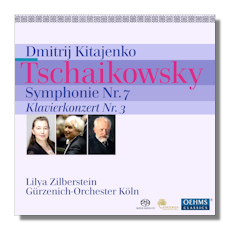
The Internet's Premier Classical Music Source
Related Links
- Tchaikovsky Reviews
- Latest Reviews
- More Reviews
-
By Composer
-
Collections
DVD & Blu-ray
Books
Concert Reviews
Articles/Interviews
Software
Audio
Search Amazon
Recommended Links
Site News
 SACD Review
SACD Review
Piotr Ilyitch Tchaikovsky

Rarities
- Symphony #7 in E Flat Major (From sketches, arr. Semyon Bogatyrjow)
- Piano Concerto #3
Lilya Zilberstein, piano
Gürzenich-Orchester Köln/Dmitri Kitajenko
Oehms Classics SACD OC672 Hybrid Multichannel 56:42
If Wikipedia is to be believed, Kitayenko becomes the eighth conductor to record the "Seventh" symphony of Tchaikovsky, and almost certainly the first to couple it with the posthumous Third Piano Concerto. Kitayenko's previous Tchaikovsky efforts have been well received, but even so, the appeal of this latest installment is limited. Of the three concertos for piano, the third is the least known and respected, and very few conductors – as noted above – have ever bothered with the Symphony. Still, the work is composed by Tchaikovsky, at least in some way, and no less than Eugene Ormandy felt strongly enough about the music to record it for Columbia. Just how well does it actually hold up?
Following a typically brooding introduction, the first movement evolves into a very Russian-sounding symphonic Allegro. It's a passionate but also rather start-and-stop affair that doesn't compare to this master's great works, or even the works of those below him. If the best thing you can say about a Tchaikovsky work is that it sounds "Russian", it probably is best to say less. Conversely, the Andante is a gloriously emotive movement that is utterly simplistic in its beauty and charm. Credit Semyon Bogatyrjow for keeping things simple and letting these melodies shine. The result is pretty special. A scherzo follows, recalling the quicker dramatic scenes in the ballet. It really does capture the Tchaikovsky's genuine feel for dance music and for the woodwinds and strings. If it sounds like something better suited on a stage, it still is beautifully crafted. The Finale is bombastic and superficially exciting but offers nothing that the superior conclusions of the accepted symphonies don't better realize. Throughout, the Cologne forces play with a real sense of enthusiasm and zest, attacking the score as a major artistic statement. For all the shortcomings, I believe the work is worth hearing, and the sound quality is excellent.
The Third Piano Concerto is the second ugly stepsister to the more famous First. At only 15 somewhat clunky minutes, the former work really has nothing on the latter, so don't fear if you haven't heard it; it's not some neglected masterpiece. It is nice to have, especially if you are a collector or fan, and Zilberstein is a fine artist who doesn't seem to get very much attention these days. She does what she can with the score, and the conductor does manage to bring out some really nice detail, especially in the woodwinds. Ultimately, if you want these pieces on SACD – or at all – this is a very innovative way to get them. For specialists only.
Copyright © 2014, Brian Wigman




















